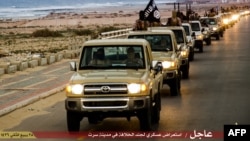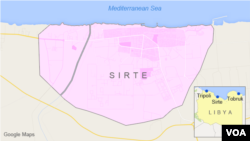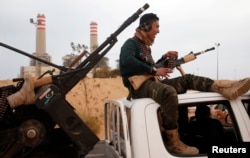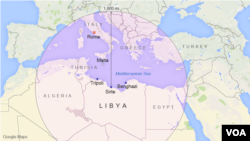Islamic State militants have executed at least 49 people — including captive fighters, political opponents and locals accused of sorcery — since February of last year in Libya’s Mediterranean port city of Sirte, the terror army’s largest stronghold outside Syria and Iraq, according to a report released Wednesday by an international rights group.
IS militants have engaged in kidnappings, and dozens of captured Libyan militia fighters have gone missing in Sirte, many are presumed dead, according to Human Rights Watch.
Islamic Sharia Law
As in other towns IS controls in the region, the jihadist group has imposed its Draconian interpretation of Islamic Sharia law in Sirte, regulating all aspects of everyday life for locals “down to the length of men’s trousers, the breadth and color of women’s gowns, and the instruction students receive in state schools,” says HRW in a report called “We Feel We Are Cursed.”
The militants are also failing to provide “basic necessities to the local population,” says the rights group. “Instead it is diverting food, medicine, fuel, and cash, along with homes it confiscated from residents who fled, to as many as 1,800 fighters, police and functionaries it has amassed in the city.”
Police state like control
The HRW report comes as locals in Sirte are reporting that IS commanders have tightened security in the town and are stockpiling food and supplies in anticipation of a major assault on the city, the hometown of Libya’s former strongman Colonel Moammar Gadhafi.
On Monday, after a meeting in Vienna featuring diplomats from more than 20 countries, Western powers announced their readiness to help Libyans combat IS, which controls nearly 300 kilometers of the country’s coastline, by arming the country’s struggling United Nations-negotiated Government of National Accord (GNA).
Tough going for Western-backed forces
Militias from Misrata, which are supporting the GNA, have been involved in fierce fighting with IS and this week managed to capture from IS fighters a strategic crossroads at Abu Grain seized by the militants last month.
Forces loyal to General Khalifa Haftar, which are opposed to the GNA and support the rival National Salvation Government, have been fighting near Sirte as well and may be gearing up to attack the coastal city before arms can be supplied by Western powers to GNA-loyal militias, say analysts.
HRW reports atrocities inside Sirte
In its investigation of what life is like in Sirte under IS rule, HRW says locals describe scenes of horror with “public beheadings, corpses in orange jumpsuits hanging from scaffolding in what they referred to as ‘crucifixions,’ and masked fighters snatching men from their beds in the night.” Locals said the terror army’s morality police, or Hisba, patrol streets, threatening to fine or flog men for smoking, listening to music, or failing to ensure their wives and sisters are covered in all-enveloping black abayas.
According to a 30-year-old woman called Ahlam interviewed by HRW investigators: “Life in Sirte is unbearable. Everyone is living in fear. They are killing innocent people. There are no groceries, the hospital has no doctors or nurses, there is no medicine. …There are spies on every street. Most people have left but we are trapped. We don’t have enough money to leave.”
HRW interviewed 45 Sirte locals — either during face-to-face meetings in Misrata, where they had fled, or by phone or using the Internet for those who had not left the city. All interviewees said IS has been looting and destroying homes of those they deemed foes. Militants had shuttered stores stocking Western-style clothing and lingerie. Militiamen, opponents and those judged to have offended the Sharia law practiced by IS are held in three jails opened by the militants — including one in a former kindergarten.
HRW reports most residents have left Sirte
Communications with the outside are closely monitored — locals are instructed to use IS-run call centers, say locals. HRW estimates more than two-thirds of Sirte’s 80,000 residents have fled since IS overran the city just over a year ago.
IS has been happy to advertise its methods of rule. On May 9, the militants posted a gory video — “Killing the Followers of Satan” — documenting the beheading and shooting of three medical volunteers from Haftar’s forces, captured during fighting in the eastern Libyan city of Benghazi.
Western powers determined
The U.S. and European governments have become increasingly anxious about the IS presence in Libya, a short boat ride from Italy, and appear now determined to shore up the GNA in a bid to bring some stability to a country that has known little since the ouster five years ago of Colonel Gadhafi in a popular uprising backed by NATO.
But efforts to help the GNA establish its authority beyond Tripoli suffered a further blow Tuesday when Haftar told a Libyan TV station that any decisions taken by the Western-backed Prime Minister, Fayez al-Serraj, are just “ink on paper.”
















